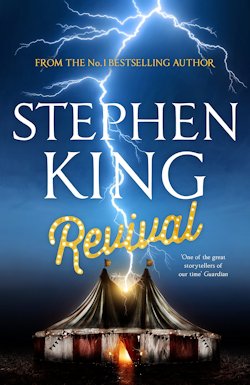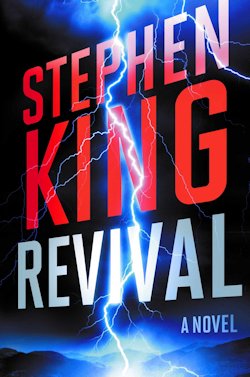Whether you love his work or loathe it—and there are those who do, difficult as that is for those who don’t to discern—you’ve got to give Stephen King credit, in the first for working so damned hard. Over the forty years of his career, he’s written fifty-odd novels, and financially, you have to imagine he’d have been sitting pretty after the first five.
This, then, isn’t a man who does what he does for the money. Demonstrably, I dare say, he does it for the fun, and that’s a fine thing, I think; after all, to paraphrase Dreamcatcher’s central character, doing the same shit day after day does get dull, and dull is the last thing a writer writing recreationally can afford to be. To escape that fate, King has reinvented himself repeatedly in recent years. He’s come up with a couple of very credible crime thrillers, commingled conspiracy with the stuff of science fiction and composed love letters to the old days and ways.
In that respect, Revival is a real throwback. A supernatural horror novel of the sort Constant Reader hasn’t seen since Duma Key, it’s classic King, complete with fantastic characters, a suggestive premise and an ending I’m going to politely describe as divisive.
Revival begins reflectively:
In one way, at least, our lives really are like movies. The main cast consists of your family and friends. The supporting cast is made up of neighbours, co-workers, teachers, and daily acquaintances. There are also bit players: the supermarket checkout girl with the pretty smile, the friendly bartender at the local watering hole, the guys you work out with at the gym three days a week. And there are thousands of extras—those people who flow through every life like water through a sieve, seen once and never again. […] But sometimes a person who fits none of these categories comes into your life. This is the joker who pops out of the deck at odd intervals over the years, often during a moment of crisis. In the movies this sort of character is known as the fifth business, or the change agent. When he turns up in a film, you know he’s there because the screenwriter put him there. But who is screenwriting our lives?
There’s a lot in this paragraph to unpack: the idea of the illusion of life; the allusion, not unrelatedly, to God as the author of all; and an introduction to the narrative’s eventual antagonist, Reverend Charles Jacobs. Let’s focus on that last.
Revival’s protagonist, Jamie Morton, is just six when he meets the man he thinks of as his fifth business. Jacobs has come to town to take over as minister of the local Methodist. He has his strange preoccupations—a fascination, first and foremost, with celestial electricity—but he’s a good man and a good minister. His congregation take to him—as well as his wife and sweet son—in no time; the little ones in particular love him utterly. “Youth calls to youth,” is how Jamie’s father puts it, and even in the mid-sixties, the church sure could do with a few new recruits.
All this is related to the reader in two fantastic chapters packed with colour and charm and character… then a devastating turn occurs. I flat-out refuse to ruin it, except to say that this shocking sequence—the human horror of which haunted me for ages afterward—puts both Jamie and Jacobs on the paths King picks up on a period of decades later. The former is a musician hooked on horse; the latter has, after a “stint at Joyland,” left the Good Lord behind to focus on his first love, divine lightning:
“In spite of its vast power to kill and cure, in spite of the way it’s reshaped the lives of every person on the planet, and in spite of the fact that it is still not understood, scientific research in this field is viewed with good-natured contempt! Neutrons are sexy! Electricity is dull, the equivalent of a dusty storage room from which all the valuable items have been taken, leaving only worthless junk. But the room isn’t empty. There’s an unfound door at the back, leading to chambers few people have ever seen, ones filled with objects of unearthly beauty. And there’s no end to those chambers.”
When the men meet again, Jacobs saves Jamie from his addiction:
He cured me, but it was a dangerous cure, and he knew it—when one speaks of acceptable risks, the question is always acceptable to whom? Charlie Jacobs was a Good Samaritan. He was also a half-mad scientist, and that day in the abandoned body shop I was his latest guinea pig. He could have killed me, and sometimes—many times, actually—I wish he had.

The pair go their separate ways after this unheavenly intervention, only for fate to bring them together again and again—and not always as friends. By the last act, in fact, Jamie and Jacobs are fundamentally enemies, as our everyman believes that “someone needs to call [the minister-cum-carny] to account for what he’s done.” What he’s done is a lot of good and, by accident, a bit of bad; why Jamie sets himself against his sometime saviour is the second biggest contrivance in Revival.
The first is the unfortunate finale. What awaits in the chambers of Jacobs’ imagination is… let’s say less laughable than Under the Dome’s badly-behaved baby alien. Credit to King, he does a decent job of telegraphing this twist—we need look no further than the Lovecraft epigraph for evidence of the text’s intent—still, it’s ill-fitting; silly instead of chilling, such that it undercuts the effectiveness of the ending’s less eldritch elements.
Be that as it may, there are markedly more rights than wrongs in the rest of Revival. The characterisation of Jamie and Jacobs is, predictably, pitch-perfect. Hero and villain alike are put through the wringer over the course of the story, by dint of which exhilarating incidents their characters are deliberately and deftly developed. Furthermore, we know things are going to go wrong between them from the get-go, and even if their eventual opposition isn’t exactly satisfying, King’s frequent teases add an electric tension to their every exchange.
Both Jacobs and Jamie will be known to folks who’ve read a reasonable amount of King’s fiction—not because they themselves have appeared before, but because they’re variations on the same broken souls the author has been especially interested in since his own accident in 1999. Certain other aspects of Revival are similarly familiar: the carnival culture comes from Joyland, he’s explored electricity in a number of novels, and, of course, he’s been making fiction of his faith forever, as far back as in Carrie and The Stand.
Constant Reader, at least, has already seen a lot of what Revival has to offer, but not for quite a while, and never in this particular configuration. In addition, King is simply a substantially better writer than he was when last he applied his masterful craft to a supernatural horror novel along these lines. His sense of the peaks and valleys of pacing is better; he’s much more direct in general, coming to the point, whatever the point may be, far quicker than he did.
I dare say Revival doesn’t reinvent the wheel, but it doesn’t need to, either. It’s classic King: the power source remains the same—high capacity and remarkably reliable—but the wiring connected to Revival’s capacitors? Wicked efficient.
Revival is available now from Scribner.
Niall Alexander is an extra-curricular English teacher who reads and writes about all things weird and wonderful for The Speculative Scotsman, Strange Horizons, and Tor.com. He’s been known to tweet, twoo.










